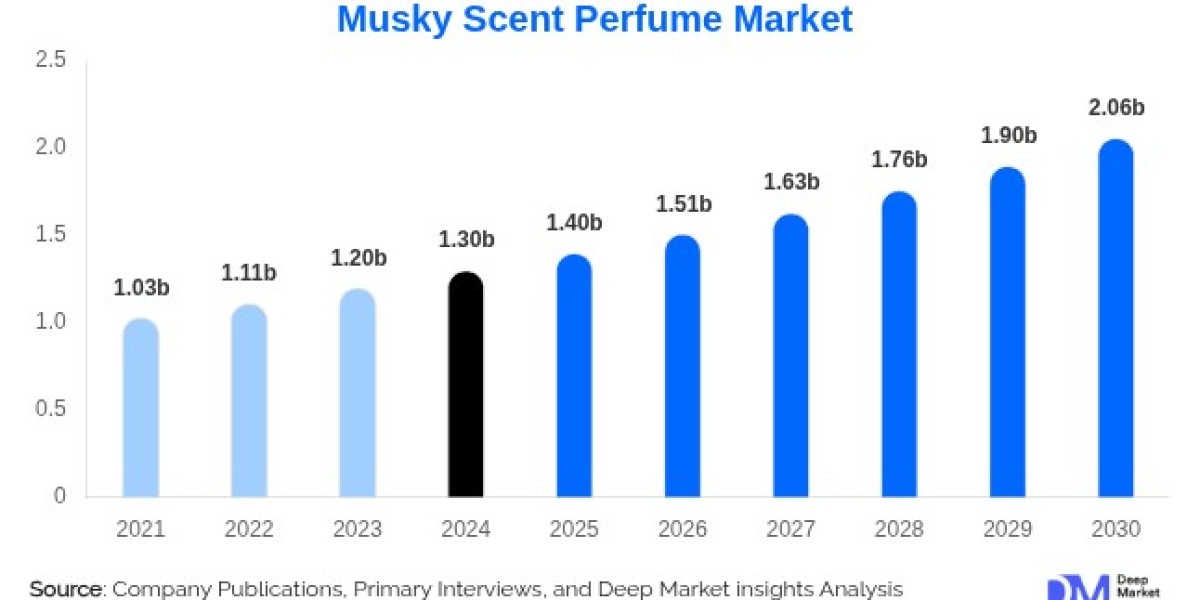According to Deep Market Insghts,The global musky scent perfume market, valued at USD 1.3 billion in 2024, is projected to grow from USD 1.4 billion in 2025 to USD 2.06 billion by 2030, registering a compound annual growth rate (CAGR) of 8% during the forecast period, according to the latest market analysis.
The strong performance of this market is driven by rising consumer demand for warm, long-lasting fragrances that embody sophistication and sensuality. Musk, long recognized for its depth and versatility, has emerged as a key ingredient in both mainstream and niche perfumery. Its role as a popular base note in gender-neutral and unisex fragrances has further accelerated global adoption.
Market Growth Drivers
The expansion of the musky scent perfume market is underpinned by rising disposable incomes, particularly in emerging economies where consumers increasingly prioritize luxury self-care and grooming. Musk-based scents have gained prominence as part of daily routines, offering both sensual appeal and wellness benefits such as stress relief.
E-commerce platforms have further enhanced accessibility to premium and niche fragrances, expanding consumer reach. Wellness-focused brands are also adopting musk for aromatherapy and calming fragrance applications. A recent example is Forest Essentials, which launched its Musk, Lime & Patchouli Cologne in June 2025, blending musk with invigorating citrus and earthy notes to meet consumer demand for holistic luxury.
Market Restraints
Despite rapid growth, the industry faces constraints linked to environmental regulations and health safety concerns surrounding synthetic musks. Regulatory frameworks such as the EU’s REACH and U.S. EPA restrictions have banned certain compounds due to bioaccumulation and toxicity risks. This has increased R&D and compliance costs, particularly for small-scale perfumers, while narrowing the available ingredient palette.
As consumers increasingly demand clean and sustainable options, perfumers are investing in eco-friendly synthetic musks and botanical alternatives, balancing innovation with regulatory requirements.
Key Opportunities
The market is witnessing significant opportunity in niche and custom fragrances, as consumers seek personalized scents over mass-market offerings. Musk’s intimate and skin-like quality makes it a preferred note for bespoke blends that emphasize individuality.
For instance, French niche brand L'Orchestre Parfum launched Mono Cachemire at Esxence 2024 in Milan, a musky creation designed to evoke the warmth of cashmere. This reflects a growing appetite for artisanal storytelling, exclusivity, and personalization in fragrance.
Segment Insights
By Product Type: Perfumes, with the highest concentration of fragrance oils (20–30%), lead the market. Their long-lasting, bold musky notes are particularly valued by luxury consumers.
By Gender: Men’s musky fragrances hold a significant share, built on bold base notes such as amber, leather, and tobacco. Iconic collections by brands like Dior, Tom Ford, and Yves Saint Laurent continue to drive this segment.
By Packaging: Glass bottles dominate, safeguarding fragrance integrity and projecting premium appeal. Brands are also adopting refillable and recyclable glass options to align with sustainability trends.
By Application: Personal daily wear remains the largest application, as musk-based perfumes are increasingly used to establish personal scent identities and complement grooming routines.
Regional Highlights
North America leads the global market, supported by strong luxury spending and a culture of grooming and self-expression. Exclusive musky fragrances resonate with consumers seeking individuality and status.
Asia-Pacific is the fastest-growing region, driven by rising disposable incomes, urbanization, and growing influence of K-beauty and J-beauty. E-commerce platforms such as Tmall, Shopee, and Nykaa are key enablers of regional growth.
Europe maintains a stable market, rooted in its perfumery heritage and consumer preference for artisanal craftsmanship and sustainable products.
Competitive Landscape
The musky scent perfume market is highly competitive, with global luxury houses and niche perfumers vying for consumer attention. Key players include LVMH, Estée Lauder Companies, Chanel, Coty Inc., L'Oréal, Maison Francis Kurkdjian, Creed, Firmenich, Givaudan, and International Flavours & Fragrances.
LVMH leverages strong brand heritage through Dior and Givenchy, supported by global retail presence via Sephora. In January 2025, LVMH highlighted strong sales growth driven by Dior’s Sauvage and the revitalized J’adore, fronted by Rihanna. Similarly, Estée Lauder continues to build on its premium portfolio, with Tom Ford and Jo Malone offering distinctive musky blends.
Recent Developments
April 2025 – Chanel introduced Chance Eau Splendide, a fruity-floral fragrance with a musky base crafted by Olivier Polge.
January 2025 – Tom Ford expanded its Private Blend collection with Rose Exposed, featuring a musky, woody base blended with rose absolute.
February 2025 – Le Labo launched Eucalyptus 20, a gender-neutral perfume highlighting musk within a complex, mood-driven composition.
Outlook
The musky scent perfume market is positioned for steady growth through 2030, underpinned by rising luxury consumption, the shift toward unisex and experiential fragrances, and consumer appetite for sustainable, niche products. While regulatory challenges remain, innovation in synthetic musk alternatives and artisanal craftsmanship are expected to drive the next wave of product development and global market expansion.
About Us:
Deep Market Insights is a leading market research organization, specializing in research, analytics, and advisory services along with providing business insights & market research reports
Contact Us:
Website: https://deepmarketinsights.com/







